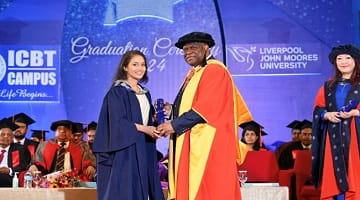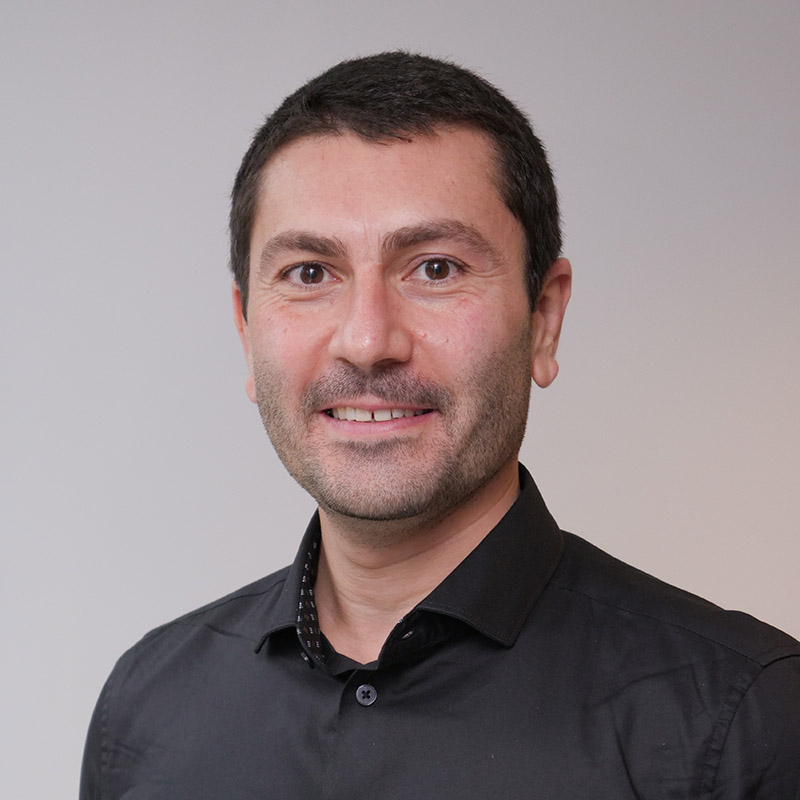2025/26 entry Applications also open for 2024/25
MSc Quantity Surveying and Commercial Management | Part-time
About this course
Fast track your career with this RICS accredited Quantity Surveying and Commercial Management Masters from LJMU and prepare for senior management roles.
- This Programme is also available as a 240 credit routeway including a Group Project and Dissertation
- Study on a course supported by industrial partners such as Laing O'Rourke and Lovell, and professionally accredited by the Royal Institution of Chartered Surveyors (RICS)
- Benefit from the internationally recognised research of our Built Environment and Sustainable Technologies (BEST) Research Institute
- Opt for the part-time, day release study option if you are already in employment
- Look forward to career roles as a Contractor, Supply Chain Manager, Consultant or within QS client organisations
This Quantity Surveying and Commercial Management MSc is the ideal degree if you want to move into a senior management role in this highly challenging and dynamic industry.
Cost management of construction processes is vital throughout the life cycle of a project. This requires a good understanding of the commercial aspects of development and construction, and the environment in which these operate.
On this course you will address projects from the perspectives of both demand and supply, and focus on the procurement and financial control of construction projects. The programme is ideally suited to students involved in the procurement of built assets, for example on behalf of project sponsors in the public sector. In addition to RICS accreditation and a Masters qualification, you will also gain many lifelong managerial and professional career skills through the programme.
Fees and funding
There are many ways to fund postgraduate study for home and international students
Fees
The fees quoted at the top of this page cover registration, tuition, supervision, assessment and examinations as well as:
- library membership with access to printed, multimedia and digital resources
- access to programme-appropriate software
- library and student IT support
- free on-campus wifi via eduroam
Additional costs
Although not all of the following are compulsory/relevant, you should keep in mind the costs of:
- accommodation and living expenditure
- books (should you wish to have your own copies)
- printing, photocopying and stationery
- PC/laptop (should you prefer to purchase your own for independent study and online learning activities)
- mobile phone/tablet (to access online services)
- field trips (travel and activity costs)
- placements (travel expenses and living costs)
- student visas (international students only)
- study abroad opportunities (travel costs, accommodation, visas and immunisations)
- academic conferences (travel costs)
- professional-body membership
- graduation (gown hire etc)
Funding
There are many ways to fund postgraduate study for home and international students. From loans to International Scholarships and subject-specific funding, you’ll find all of the information you need on our specialist postgraduate funding pages.
Please be aware that the UK’s departure from the EU may affect your tuition fees. Learn more about your fee status and which tuition fees are relevant to you.
Employability
Further your career prospects
LJMU has an excellent employability record with 96% (HESA 2018) of our postgraduates in work or further study six months after graduation. Our applied learning techniques and strong industry connections ensure our students are fully prepared for the workplace on graduation and understand how to apply their knowledge in a real world context.
When you graduate with an MSc in Quantity Surveying and Commercial Management, you will enjoy full exemption (excepting the Assessment of Professional Competence) from the RICS educational requirements and be eligible for direct entrance on to the RICS Assessment of Professional Competence professional training programme.
The student experience
Discover life as a postgraduate student at LJMU.
News and views
Browse through the latest stories and updates from the University and beyond
Course modules
Discover the building blocks of your programme
Your programme is made up of a number of core modules which are part of the course framework. Some programmes also have optional modules that can be selected to enhance your learning in certain areas and many feature a dissertation, extended report or research project to demonstrate your advanced learning.
Core modules
Dissertation
60 credits
This module develops and tests your ability to prepare a dissertation, based on the study of a subject related to your chosen discipline within the built environment. Dissertation preparation normally takes place after completion of the Postgraduate Diploma stage.
Construction Technology
10 credits
The aim of this module is to review and analyse construction methods and building services installations for domestic buildings, framed structures, and commercial/industrial buildings.
Research Methods
10 credits
This module focuses on your critical understanding of the research process. In preparation for your research study, it also develops skills in research design, implementation and presentation. You will come to understand the differing techniques, strategies and methods used to undertake research in the built environment.
Sustainable Procurement
20 credits
In this module you will examine existing procurement options and their effectiveness in meeting the client's requirements. You will also examine sustainable construction and the development of procurement strategies which address sustainable construction principles.
Construction Contract Strategy
20 credits
In this module you will develop a strategic knowledge and critical appreciation of construction contract law to enable the student to consider in detail the application of it to construction and engineering projects.
Quantity Surveying Professional Practice
20 credits
This module encourages students to apply the theory, concepts and procedures of quantity surveying professional skills using standard industry practice.
BIM Enabled Financial Management
20 credits
The aim of this module is to introduce financial management techniques used in construction in order to manage the lifecycle cost of built environment facilities. The module will also deliver the fundamental concepts that link financial management and BIM, such as the cash flow forecasts, cost plans, cost value reconciliation and whole life cycle management of construction facilities.
Collaborative BIM Project
20 credits
The module is an opportunity for students to follow BIM protocols and practice in a collaborative multidisciplinary project team to achieve project success.
Teaching
An insight into teaching on your course
Teaching methods
You will learn via formal keynote lectures, coursework tasks and guided independent study.
Applied learning
The programme team has extensive links with both professional bodies and industry this facilitates guest lectures and seminars by leading practitioners.
Assessment
How learning is monitored on your programme
To cater for the wide-ranging content of our courses and the varied learning preferences of our students, we offer a range of assessment methods on each programme.
Assessment methods on this programme include examination, assignments, essays, problem solving scenarios, projects and case study based tasks.
Course tutors
Our staff are committed to the highest standards of teaching and learning
Dr Onur Dursun
Programme Leader
Dr Onur Dursun has joined the School of Civil Engineering and Built Environment as Senior Lecturer in Quantity Surveying in 2019. Prior to this appointment, Onur was an Assistant Professor at the Department of Architecture, Yasar University (Izmir, Turkey); a Visiting Lecturer at German University in Cairo (Berlin, Germany); and a Researcher at the Institute of Construction Economics, University of Stuttgart (Germany) and Teaching Assistant at Istanbul Technical University (Turkey). He was awarded a Doctor of Engineering (Dr.-Ing.) degree in the subject of Construction Economics by University of Stuttgart in 2013. He obtained two MSc degrees in Construction Project Management from University of Reading (UK) and Istanbul Technical University (Turkey) in 2008 and 2009, respectively. Onur is interested in research areas/topics related to (1) construction economics – early estimation of key project determinants using statistical modelling and machine learning methods; (2) optimization of building design based on selected performance metrics using simulations coupled with genetic algorithms; (3) integration of virtual reality in building design education. Throughout his career, Onur has taught wide spectrum of subjects in built environment at all levels - including, but not limited to, construction project management, economic evaluation of building projects, legal aspects of building projects, virtual environments in building design, research approaches and design, and structural design and analysis.
-
 Principal Lecturer
Principal Lecturer -
 Lecturer/Senior Lecturer
Lecturer/Senior Lecturer -
 Lecturer/Senior Lecturer
Lecturer/Senior Lecturer -
 Lecturer/Senior Lecturer
Lecturer/Senior Lecturer -
 Lecturer/ Senior Lecturer
Lecturer/ Senior Lecturer
School facilities
What you can expect from your School
This programme is based in the City Campus. Besides well-equipped workshops, we have: a structural testing laboratory, a concrete laboratory, a radio frequency and microwave laboratory, a highways research laboratory, an industrial chemistry laboratory, a soil mechanics laboratory, hydraulics laboratory, surveying laboratory, light structure and materials laboratory, building information modelling (BIM) software and expertise and smart homes.
Entry requirements
You will need:
Qualification requirements
Undergraduate degree
-
a minimum 2:2 in a relevant subject
Alternative qualifications considered
-
a professional qualification with considerable relevant work experience
International requirements
-
IELTS
- IELTS English language requirement: 6.5 (minimum 5.5 in each component)
Further information
- Extra Requirements
-
RPL
- RPL is accepted on this programme
Application and selection
Securing your place at LJMU
To apply for this programme, you are required to complete an LJMU online application form. You will need to provide details of previous qualifications and a personal statement outlining why you wish to study this programme.
You need to demonstrate that you have a sufficient level of knowledge to embark on the programme and to complete it within the time limits. You should provide evidence, at the interview stage, of your learning capabilities and commitment to a postgraduate programme of study.
Applications from non-standard applicants are welcomed.
The University reserves the right to withdraw or make alterations to a course and facilities if necessary; this may be because such changes are deemed to be beneficial to students, are minor in nature and unlikely to impact negatively upon students or become necessary due to circumstances beyond the control of the University. Where this does happen, the University operates a policy of consultation, advice and support to all enrolled students affected by the proposed change to their course or module.











